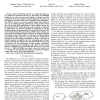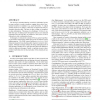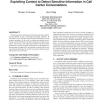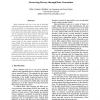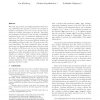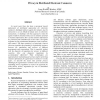150
click to vote
GLOBECOM
2010
IEEE
14 years 11 months ago
2010
IEEE
Abstract--Today's file sharing networks are creating potential security problems to enterprise networks, i.e., the leakage of confidential documents. In order to prevent such ...
113
click to vote
IEEESP
2010
15 years 16 days ago
2010
The need for controlled sharing of sensitive information occurs in many realistic everyday scenarios, ranging from critical (e.g., national security) to mundane (e.g., social netw...
114
click to vote
ISI
2006
Springer
15 years 2 months ago
2006
Springer
Access control mechanisms are commonly used to provide control over who may access sensitive information. However, malicious users can exploit the correlation among the data and in...
123
click to vote
ICDE
2010
IEEE
15 years 2 months ago
2010
IEEE
— The increasing popularity of social networks, such as Facebook and Orkut, has raised several privacy concerns. Traditional ways of safeguarding privacy of personal information ...
152
click to vote
CIKM
2008
Springer
15 years 4 months ago
2008
Springer
Protecting sensitive information while preserving the shareability and usability of data is becoming increasingly important. In call-centers a lot of customer related sensitive in...
135
click to vote
ACSAC
2006
IEEE
15 years 5 months ago
2006
IEEE
When an application reads private / sensitive information and subsequently communicates on an output channel such as a public file or a network connection, how can we ensure that ...
127
click to vote
ICDM
2007
IEEE
15 years 5 months ago
2007
IEEE
Many databases will not or can not be disclosed without strong guarantees that no sensitive information can be extracted. To address this concern several data perturbation techniq...
122
click to vote
PODS
2000
ACM
15 years 6 months ago
2000
ACM
We study the problem of auditing databases which support statistical sum queries to protect the security of sensitive information; we focus on the special case in which the sensit...
102
click to vote
HICSS
2002
IEEE
15 years 7 months ago
2002
IEEE
In recent years there has been a movement toward deployment of distributed approaches for electronic commerce. Intelligent software agents, for instance, may be instructed to act ...
125
click to vote
CCS
2004
ACM
15 years 7 months ago
2004
ACM
Access control can be used to ensure that database queries pertaining to sensitive information are not answered. This is not enough to prevent users from learning sensitive inform...
